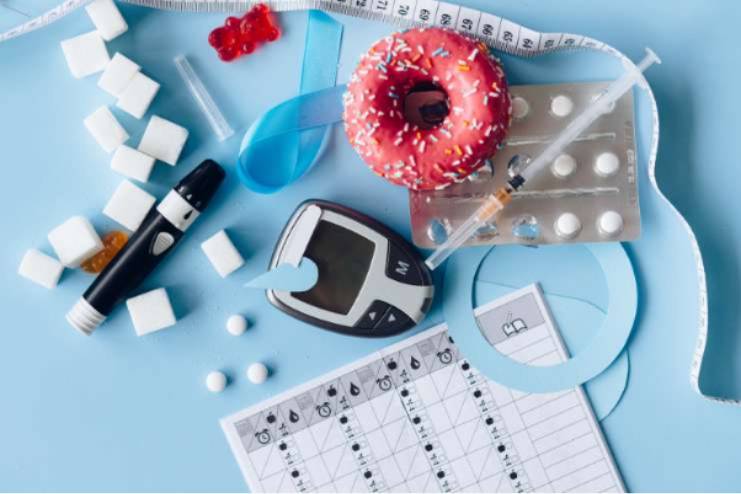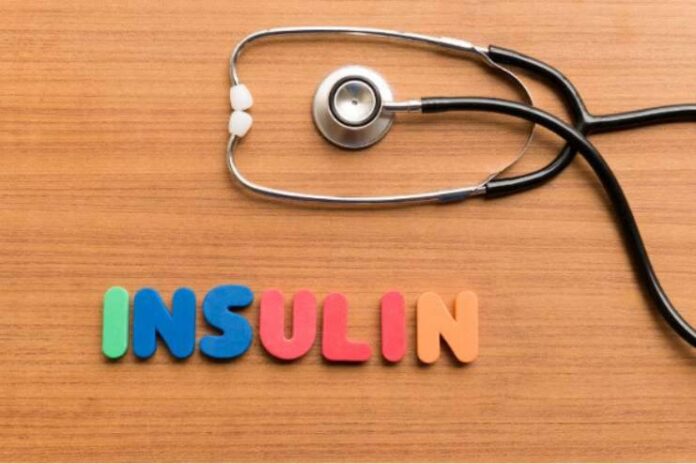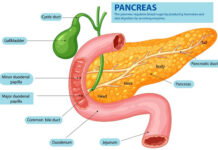Affiliate Disclaimer
Some links in this article are affiliate links. We may earn a small commission if you make a purchase through these links, at no extra cost to you. We only recommend products we find useful to our readersInsulin is the hormone that is essential for controlling blood sugar levels. The amount that one unit of insulin may lower blood glucose levels is known as the insulin sensitivity factor, also known as the correction factor.
However, as insulin sensitivity declines, the body finds it more difficult to control glucose, raising blood sugar levels and increasing the risk of diseases like type 2 diabetes.
Understanding insulin sensitivity is crucial in preventing chronic diseases and preserving the body’s energy balance, as it affects blood sugar regulation and overall metabolic health.
Understanding Insulin Sensitivity

A measure of how well your body’s cells react to insulin is called insulin sensitivity. After a meal, the glucose levels in the bloodstream increase, signaling the pancreatic beta cells to release insulin. Insulin facilitates the absorption of sugar in the bloodstream and into bodily cells, including muscle, fat, and heart cells, allowing them to use it for energy and other vital functions.
After eating a meal, the body uses only a portion of the energy immediately. Insulin helps facilitate the storage of the excess glucose as glycogen in the liver. When energy is needed or when blood sugar levels are low, the liver releases glucose into the bloodstream.

However, when insulin sensitivity declines, cells become less susceptible to its effects. In response, the pancreas produces more insulin, but over time, this may result in persistently elevated blood sugar levels and, ultimately, type 2 diabetes.
Impairment in insulin sensitivity, frequently associated with obesity, sedentary lifestyles, and poor diets, upsets this equilibrium and can result in a series of health problems.
Also, read: 15 Natural Ways to Lower Insulin Levels For An Energetic Life
The Role of Diet in Insulin Sensitivity

Enhancing insulin sensitivity mostly depends on diet, with some foods having powerful effects. A growing body of research shows that dietary composition significantly affects the risk of obesity, Type 2 diabetes, cardiovascular disease, certain endocrine cancers, and various other interconnected metabolic and reproductive illnesses characterized by insulin resistance.
Below are some dietary recommendations to improve insulin sensitivity:
- Whole Grains: The high fiber content of whole grains, such as quinoa, brown rice, and oats, slows down glucose absorption and helps stabilize blood sugar levels. These whole grains, as opposed to refined carbohydrates, lower blood sugar spikes and demand less insulin, improving sensitivity.
- Healthy Fats: Nutritious fats, especially those found in nuts, seeds, avocados, and olive oil, are essential. These fats contain anti-inflammatory qualities that help maintain the health of your cells and enhance your body’s reaction to insulin.
- Vegetables and Fruits: Vegetables, legumes, and fruits like berries are rich in fiber and significantly impact digestion. They feed the good bacteria in the gut, which aids in maintaining a healthy microbiome that supports better insulin sensitivity by improving the overall regulation of blood sugar levels.
- Lean Proteins: Fish, chicken, and plant-based proteins like lentils and tofu support muscle mass maintenance by supplying essential amino acids without excessive saturated fat. This helps stabilize blood sugar levels by preventing excessive insulin release and ensuring efficient glucose uptake by muscle cells.
Foods to Avoid:
- Refined Carbohydrates: Foods high in refined carbohydrates and low in fiber, such as white bread, pastries, and sugary cereals, can cause sharp rises in blood sugar and a reduction in insulin sensitivity.
- Sugary Beverages: Because they are high in sugar and low in fiber, sodas, sweetened coffees, and energy drinks can raise blood sugar levels and cause insulin resistance.
- Highly Processed Foods: Convenience and packaged snacks frequently have high amounts of sodium, bad fats, and added sugars, all of which can aggravate insulin resistance.
Cardiovascular disease risk is increased by impaired insulin sensitivity. Insulin sensitivity is increased by calorie restriction and weight loss, but it is unclear how changing the macronutrient composition may affect insulin sensitivity.
Read More: 19 Foods That Don’t Spike Insulin – Know About The Diabetes Friendly Diet
Physical Activity and Its Effect on Insulin Sensitivity

Physical activity can enhance insulin sensitivity by influencing multiple biological mechanisms. Recent studies further support the idea that regular physical activity lowers the risk of insulin resistance, metabolic syndrome, and type 2 diabetes.
Insulin sensitivity (SI) also improves when people follow exercise and physical activity guidelines. Numerous studies show a dosage response whereby higher exercise intensities, such as high-intensity interval training (HIIT), and energy expenditures result in more significant improvements in whole-body insulin sensitivity.
When you exercise, your muscles need extra energy, especially when you’re doing cardiovascular exercises like cycling, walking, or running. In response to this energy demand, insulin helps your body absorb more glucose from the bloodstream. Regular exercise gradually improves your muscles’ capacity to absorb glucose without insulin, increasing the hormone’s sensitivity in your cells.
When you exercise, your body also produces more proteins, like GLUT4, which transfers glucose into cells. This improves your body’s ability to use insulin and lowers blood sugar levels.
Furthermore, exercise reduces visceral fat accumulation—fat accumulated around the organs strongly associated with insulin resistance. Reducing visceral fat increases insulin sensitivity even further.
Weightlifting and other strength training activities increase muscular mass. More muscle allows your body to regulate blood sugar levels better because muscular tissue is more insulin-sensitive than fat tissue.
Stress and its Effect on Insulin Sensitivity

Stress dramatically affects insulin sensitivity. Cortisol and adrenaline prepare you for a “fight or flight” response. These hormones temporarily raise blood sugar by synthesizing glucose. High cortisol levels from chronic stress may reduce insulin sensitivity.
The stress-environment connection is especially strong. Environmental stressors, including pollution and toxic substances, can increase stress and insulin sensitivity. Exercise, relaxation, and meditation can improve insulin sensitivity and lower stress.
Also, read: How to Reverse and Prevent Insulin Resistance with Simple Lifestyle Changes
How Sleep Impacts Insulin Sensitivity

Sleep is another important component of insulin sensitivity. Insufficient or poor sleep disrupts glucose processing, raising blood sugar. Chronic sleep loss raises stress hormones, lowering insulin sensitivity.
Ambient light and noise can impair sleep. Poor sleep increases insulin resistance and vice versa. Proper sleep hygiene can enhance insulin sensitivity and quality of sleep. These include a regular sleep schedule and a peaceful atmosphere.
Environmental Factors that Affect Insulin Sensitivity
Genetics and environmental factors affect how sensitive our bodies are to insulin. The environment inside the womb can influence insulin sensitivity right from birth and later in life. Exposure to harmful substances and certain genetic traits can significantly impact how well the body manages insulin and other hormones. It can lead to problems with growth and development before birth, possibly resulting in low or high birth weight or being born too early.
Slow growth early in life can lead to insulin resistance, which might not become noticeable until later, especially if someone has a genetic tendency. Over the past decade, there has been a rise in type 2 diabetes and obesity among children and teenagers due to inactive lifestyles and poor eating habits.
Recent research also suggests that certain gene variations, combined with exposure to environmental factors like harmful chemicals, can affect how insulin-sensitive our tissues are.
In addition to these factors, stress and sleep also play crucial roles in insulin sensitivity, often interacting with environmental influences in complex ways.
Conclusion
Insulin sensitivity is crucial for checking blood sugar levels and preventing conditions like type 2 diabetes. You can significantly enhance your body’s reaction to insulin by adopting a healthy diet and adding frequent exercise to your daily schedule.
These lifestyle adjustments will improve your metabolic health and reduce your chance of developing chronic illnesses. Seeking guidance from healthcare specialists who can offer customized guidance and assistance based on your requirements can help you make the most out of your health journey. Proactive action today can result in better health tomorrow.
References
- https://www.medicalnewstoday.com/articles/310972
- https://www.webmd.com/diabetes/what-to-know-about-insulin-sensitivity-factor
- https://www.nih.gov/news-events/nih-research-matters/understanding-insulin-sensitivity-diabetes
- https://diabetesjournals.org/care/article/36/5/1132/29442/The-Effects-of-Carbohydrate-Unsaturated-Fat-and
- https://www.ncbi.nlm.nih.gov/pmc/articles/PMC7600669/
- https://www.sciencedirect.com/science/article/abs/pii/S2405457719303146
- https://www.healthline.com/nutrition/insulin-and-insulin-resistance
- https://journals.physiology.org/doi/full/10.1152/japplphysiol.00123.2005
- https://diabetes.org/health-wellness/fitness/blood-glucose-and-exercise
- https://www.ncbi.nlm.nih.gov/pmc/articles/PMC5569266/
- https://www.frontiersin.org/journals/physiology/articles/10.3389/fphys.2022.809669/full
- https://www.healthline.com/nutrition/improve-insulin-sensitivity
- https://jamanetwork.com/journals/jama/fullarticle/1107991
- https://portlandpress.com/biochemj/article-abstract/478/21/3827/230182/Interactions-between-insulin-and-exercise?redirectedFrom=fulltext
- https://diabetesjournals.org/care/article/39/11/2065/37249/Physical-Activity-Exercise-and-Diabetes-A-Position
- https://www.endocrine-abstracts.org/ea/0016/ea0016s22.3
- https://diabetesjournals.org/care/article/26/3/944/29206/Does-Exercise-Without-Weight-Loss-Improve-Insulin
- https://my.clevelandclinic.org/health/diseases/22206-insulin-resistance
- https://www.mdpi.com/2072-6643/12/10/304
- https://www.sciencedirect.com/science/article/abs/pii/S0160412009000816
- https://pubmed.ncbi.nlm.nih.gov/19395033/
In this Article





















